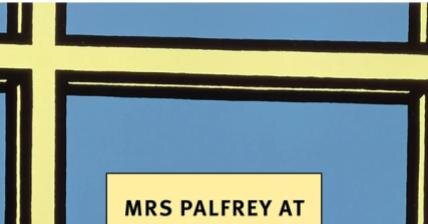Having gulped down half of her dozen novels — none have disappointed — I find myself most awfully reluctant to read anyone else. Even as the reasons for Taylor’s undercooked reputation are adduced, it still seems hard to credit, given the quantity of quality she routinely dished up — unless consideration is given to a disturbing possibility: that the books being so easy to read actually worked to her detriment.
Take “Mrs Palfrey,” her penultimate novel. It’s a doddle, about doddery old folks eking out their retirement years in a Kensington hotel that is a way station on the journey to assisted living and whatever might lie beyond. For Mrs. Palfrey that beyond extends no further than a few streets and the odd shop (Harrods, admittedly).
The ancient cast comes as a bit of a surprise at first because Taylor is so good on the obliviousness and power of youth, especially the hypnotic hold of beautiful girls over middle-aged men. A young person — called Ludo, playfully — duly shows up, but the book’s dodgy heart is clogged with a gerontian assortment of shakes, incontinence and falls (preludes to broken bones and pneumonia). It’s the late 1960s and although, in neighboring Chelsea, London might be swinging, attention at the Claremont is focused on the dessert trolley “with its load of wobbling red jellies, slopping fruit salad (mostly, Mrs. Palfrey noted, sliced apples and bananas).”
That parenthetical detail is a state-of-the-nation diagnosis, fresh in its day but expressive, like the sleigh rides in Tolstoy, of a timeless (and, in Taylor’s case, dismal) truth. The same holds good for everything that follows, but there’s a stranger aspect to Taylor’s vision too. Mrs. Arbuthnot, one of the ailing denizens of the Claremont, turns her eyes in Mrs. Palfrey’s direction. “They were such very pale blue eyes as to make Mrs. Palfrey uneasy. She thought that blue eyes get paler and madder as the years go by.” Read that and you wonder about every pair of blue eyes you’ve ever seen, or ever will see.
Madness is always beckoning here — a repressed, specifically English variant that pinches the bunioned psyche like a shoe growing tighter by the day (especially as mores grow more relaxed elsewhere). This mania is more extreme in the work of Taylor’s friend Ivy Compton-Burnett, that lunatic in chief of English writers, but Taylor shares with her a relish for dialogue that, while fiercely leashed, insists on plunging headlong into absurdity. Mrs. Arbuthnot has “ears sharpened by malice,” and there is often dishevelment and danger lurking at Taylor’s side. Something literally murderous underwrites the “English sadness” that pervades “A Wreath of Roses.” In the novella “Hester Lilly” and the novel “Angel” it’s the hideous darkness of fairy tales. In “A View of the Harbour” the monstrous is thoroughly domesticated — and vice versa: “Prudence had cooked two cods’ heads for the cats. She lifted the lid off the saucepan and out rushed an evil-smelling steam, and two pairs of boiled, reproachful eyes stared up at her.”





















Discussion about this post